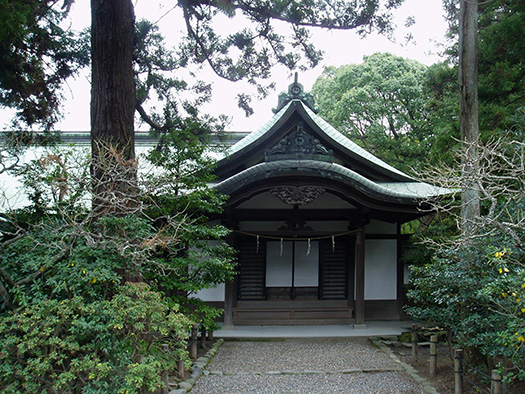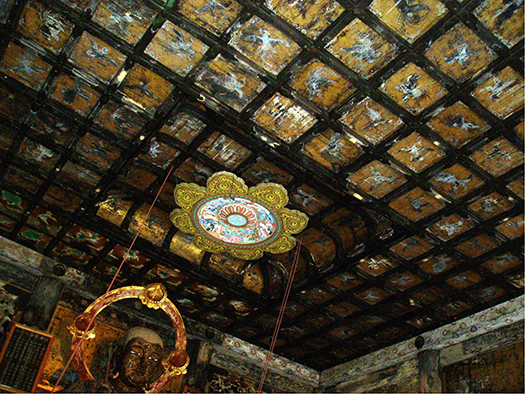

なぜこの建長寺について書くのにその前段の武家政権のことにこだわるか、
自分自身で考えてみると、どうも現代にまで至る大陸アジアと日本の関係がある。
日本史では鎌倉幕府という国家体制が成立するのだけれど、
この体制というのはアジアでは稀有な「封建主義」体制なのだと思うのです。
封建主義とは封土(収穫をうむ領土で褒美や収入として臣下家来に与えるもの)を
与えたり受け取ったりすることによって成立する主人と臣下(家来)の関係。
また、そうした関係が社会の基本なのだ、とする考え方・主張のこと。
この関係というのは個人主義を生んだり資本主義に発展していく基盤の思想。
その基本は「契約社会」ということでしょう。
日本で言えば「一所懸命」ということなのだが、こういう思想が
中国や半島国家では未成熟だったこととの相関でその後の極東アジア史は
大きく転換していったのではないかと思われるのです。
大陸中国では律令で国家制度はできていったけれど、国家権力としては
結局皇帝独裁の専制国家が現代の共産党独裁まで継続してきている。
だから宗教への弾圧が行われた。宗教は地上権力に無限の権力を与えない。
独裁政権にとっては非常に不都合な考え方なので弾圧の歴史が繰り返す。
一方の日本では朝廷の権力がどんどんと開発される新興農地支配に
有効な支配原理原則を提供することができなかった。
日本の場合は米作農業、水源管理型で個別地域独自の原理原則での経済支配が
必要不可欠とされてきて、その地域型権力として封建領主、
関東での開拓地主層が自力で領土防衛する「武士」化していった。
それら同士の平和共存のための政治制度が存在せず、
かれらは常に領土侵食される不安にさいなまれ続けていた。
既存の朝廷権力体制は「荘園」支配の分配機能しか存せず、全国に
中央の勢力所有の荘園というカタチの政治統治しかできなかった。
もちろん中央貴族・寺社勢力に各地域の個別権益を政治判断する能力は
決定的になく、結局地域での安定的政治構造はできなかったのだ。
そういう現状に対して「将軍」たる頼朝は「御恩と奉公」という
明確なルールを定めて武家による「合理的統治」を創始したのだ。
そういった日本の独自発展はその後の「元寇」にも耐えて
本格的に日本はアジア世界からの離脱を始めたのだといえる。
このような経緯がきわめて今日的な意味合いを強く感じさせてくれる。
きめ細かな地域統治の原則である「封建」がしっかり根付くことなく
常に「易姓革命」という暴力的権力支配体制が継続してきた中国では
健全な「御恩と奉公」という「統治の契約化」発展が見られなかった。
そういった連中が元寇として日本の鎌倉幕府体制に攻撃を仕掛けたけれど、
日本社会はその危機を撃退することに成功して契約社会国家体制が存続した。
・・・どうもこうした歴史的分水嶺がこの建長寺建立の時期だった。
現代で共産党独裁の中国はふたたび「元寇」のような状況に立ち至っている。
契約社会対専制独裁という、歴史は繰り返すのではないか。
English version⬇
[Dedicated system vs. “Gon and Hokoku” contract society Kenchoji Kamakura-4]
[Dedicated system vs. “Gon and Hokoku” contract society Kenchoji Kamakura-4]
Why stick to the samurai government in the previous stage when writing about this Kenchoji Temple
When I think about it myself, it seems that there is a relationship between continental Asia and Japan up to the present day.
In Japanese history, the Kamakura Shogunate is a national system, but
I think this system is a rare “feudalism” system in Asia.
Feudalism is a territory that is harvested and is given to vassal servants as a reward or income.
The relationship between the master and his vassals (servants) that is established by giving and receiving.
Also, the idea / argument that such a relationship is the basis of society.
This relationship is the basic idea that gives birth to individualism and develops into capitalism.
The basis is probably a “contract society.”
In Japan, it means “work hard”, but this kind of thought is
Correlation with the immaturity of China and the peninsula nations led to the subsequent history of Far East Asia.
It seems that it has undergone a major shift.
In mainland China, a national system was established by the decree, but as a national power
After all, the tyranny of the emperor’s dictatorship continues to the modern Communist dictatorship.
So there was a crackdown on religion. Religion does not give infinite power to earthly power.
The history of repression repeats itself because it is a very inconvenient idea for the dictatorship.
On the other hand, in Japan, the power of the imperial court is being developed more and more.
Could not provide a valid governing principle.
In the case of Japan, rice farming, water source management type, and economic control based on the principles unique to each region
Feudal lords, who have been regarded as indispensable, as their regional power
The landowners in the Kanto region became “samurai” who defended their territory on their own.
There is no political system for peaceful coexistence between them,
They were constantly suffering from anxiety about territorial erosion.
The existing imperial court power system has only the distribution function of “village” control, and it is nationwide.
Only the political rule of the form of a manor owned by the central power was possible.
Of course, the ability of central aristocrats and temples and shrines to politically judge individual interests in each region is
It was not decisive, and in the end it was not possible to establish a stable political structure in the region.
Yoritomo, who is a “general”, is called “thank you and service” for such a situation.
He set clear rules and started the “rational rule” by the samurai family.
Such unique development of Japan endured the subsequent “Mongol invasion”
It can be said that Japan has begun to withdraw from the Asian world in earnest.
This kind of background makes me strongly feel the meaning of today.
“Feudalism”, which is the principle of detailed regional governance, does not take root firmly
In China, where the violent power control system of the “easy surname revolution” has always continued
There was no sound development of “goon and hōkō”, a “contract of governance”.
Those guys attacked the Kamakura Shogunate system in Japan as a Mongol invasion.
Japanese society succeeded in repelling the crisis and the contracted social state system survived.
… It seems that such a historical watershed was the time when this Kenchoji Temple was built.
In modern times, the Communist Party dictatorship of China has once again reached a situation like the “Mongol invasion.”
The history of contract society vs. tyranny may repeat itself.
Posted on 12月 19th, 2021 by 三木 奎吾
Filed under: 住宅マーケティング, 日本社会・文化研究, 歴史探訪







コメントを投稿
「※誹謗中傷や、悪意のある書き込み、営利目的などのコメントを防ぐために、投稿された全てのコメントは一時的に保留されますのでご了承ください。」
You must be logged in to post a comment.